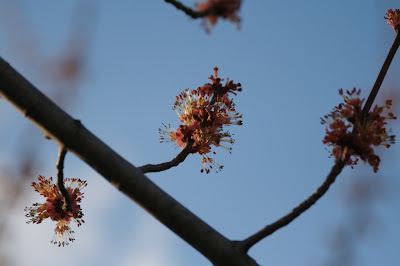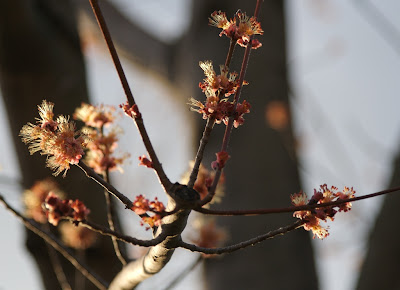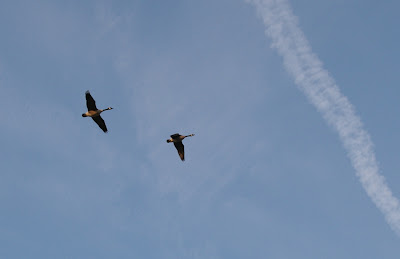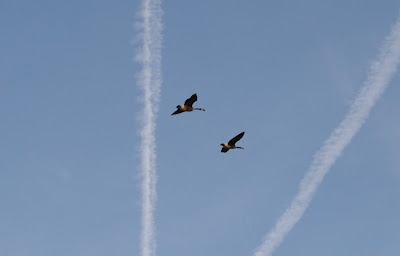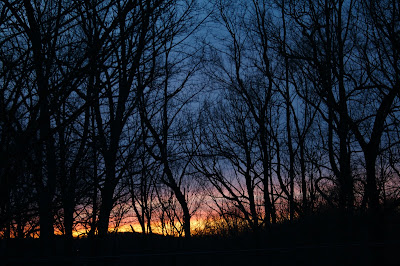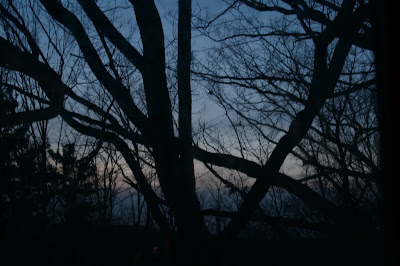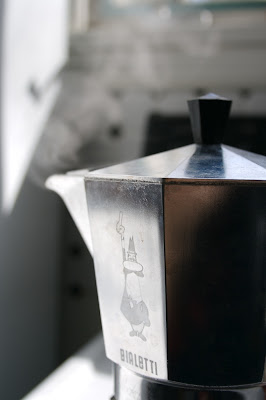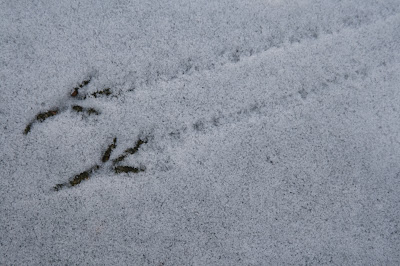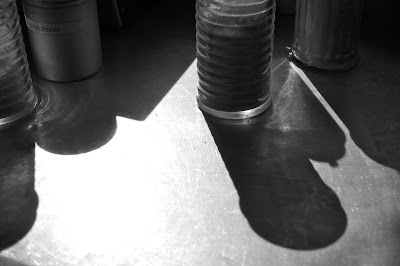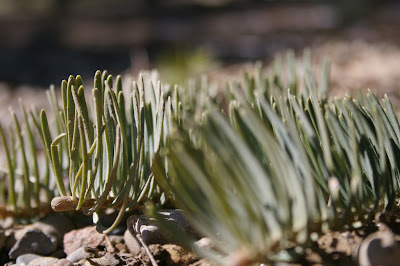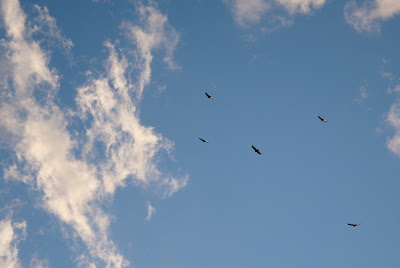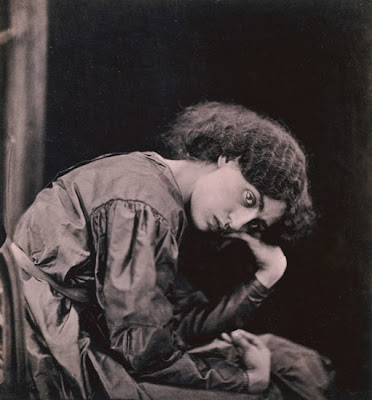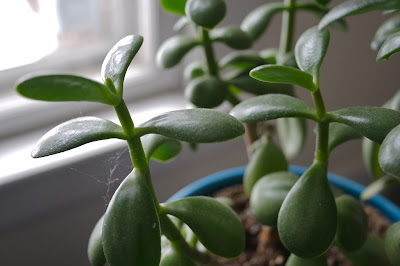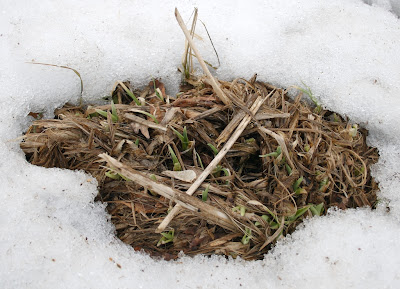Last night, the weatherman told my excellent friend and me that the forecast for the night was "moon-lit colder." Yes.
But hours before that, I had gone out from my house to check my mail and, more importantly, to see what I could see. Though the camera had come winging its way back to me on Wednesday, I'd found myself preoccupied with other things, not the least of which was the awful rain and grey of Thursday, not the least of which was a piece of writing I had to complete for Thursday morning. On Thursday, in fact, I didn't even carry the camera with me, now a highly unusual situation. But yesterday was free and clear, in every way. And so out I went.
As you know, from yesterday's writing and picture, I made it about ten feet before I'd gotten the camera out and started crawling around on the ground, where things look different:
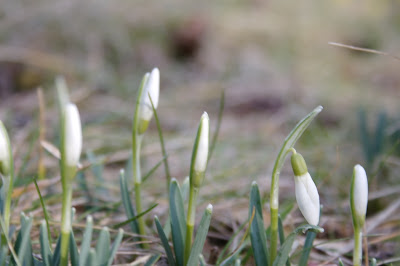
(These flowers--snowdrops, or Galanthus--are the favorites of my dear classicist friend, who used to bring the first ones of the season to my Greek classes in a tiny copper vase that he used only for this purpose.)
(And, so that you can see how different things are here today, here's what I saw when I walked out to meet a student for brunch.)
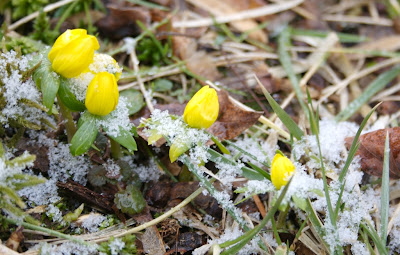
But hours before that, before the snow came back, it was a gorgeously sunny evening. At 5:05 p.m., the whites and blues before me were brilliant and staggering, almost too much to take in. I had this experience in Greece once; we arrived on Santorini (that old volcano, that big draw) in the middle of the night, and when we emerged from our inn the next morning, I could barely keep my eyes open. The world was that dazzling.
You see that today is a day for digressing.
The great joy for me at 5:05 was discovering that what I could see, the camera could see, too:
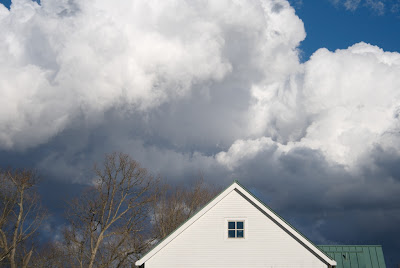
Until mid-February, all of these whites would have been brownish-grey, and by the time I'd gotten back to my computer, I'd have forgotten the precise arrangements of clouds and shadows. I might have gotten some of them back with some heavy processing of the image, but it would have been mostly accidental and also highly partial. To get a brilliant white? To keep that kind of blue? A blessing.
By the time I picked my way through the sodden lawn, I was already meditating on what it is that I try to do with the camera at all. I'm not necessarily trying to transform the world, though I also don't believe that my camera simply reflects an external reality. What I'm trying to do, as near and as simply as I can state it right now, is to put my viewer where I was when I went looking, to ask you to see what I saw--not least as a show of gratitude for my having been able to see it at all. It's an impulse that makes so much sense, when I think back to, for instance, fourth grade, when I took some little thing to show my teacher every single morning. While everyone was milling around and trickling in from school buses, she'd let us line up at her desk to show her our books or stones or pictures or whatever. I took something every day. I don't remember not having wanted to show things to people, or to tell someone something that just happened. It's why I teach, and it's why I write here. (It's presumably why you read, too.)
There was no good mail, but that was for the best because it kept me light. I stopped in at the coffeeshop for a cup of coffee--and they were serving Sumatra, my favorite coffee, the one that my grad school boyfriend used to have Peet's send me as a surprise every once in awhile. But they were also playing the worst music I've ever heard, so I gulped the coffee and hurried back out to catch more of the light and what it was doing to the world.
A field downhill from campus has flooded in our snowmelt and rainfall. I thought that I was going down the hill to photograph the flood, but there's not a good way to get near that field, especially at dusk, especially without a car. So, I did what I could with the river.

The tree you see dangling into the river on its left side there was bouncing up and down in the swift current (the river is twice its usual width and astoundingly closer than normal to the bridge, which has only a knee-high guardrail). Somehow, that metronomic tree was the most frightening thing to me about our swollen river.
Because the sunset had made a spectacle of the sky, I kept on walking away from campus, along the road toward the environmental center, continuing to revel in the fact that I can now work with my camera, now that the camera sees what I see--that is, now that its sense of light isn't so vastly diminished that I have to trick it into seeing anything at all. Because, honestly, how can I have been missing sights like this for even three months?
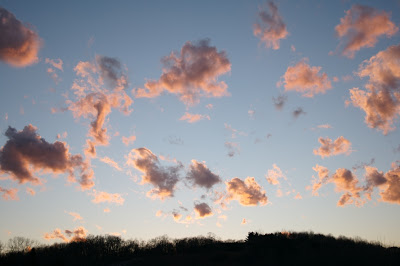

And what if I hadn't been able to show you what happened next?
As I was standing at the side of this little road, taking picture after picture of these clouds and what was changing about them with each second that passed, I realized that I should look back to see what was happening behind me. And there, the clouds were gorgeously layered, in a slightly different set of hues than the ones I'd been photographing. I took one vertical shot of these new layers. And when I looked away from the camera, lo and behold:
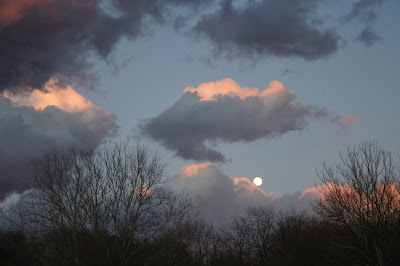
There was the moon. I could have cried right there on the road. Instead, I whispered and whispered and kept on shooting as the moon climbed higher and higher. The last line of a friend's poem--"This is one way of loving the world"--ran through me again and again. This being, this being on a road with the sun changing the clouds and the moon beginning its slow wheel across the nightening sky, this being present and alert and trying, with all humility, to capture some instant of the fullness of being there--this is my way of loving the world.
Here's a detail of that first moon shot:
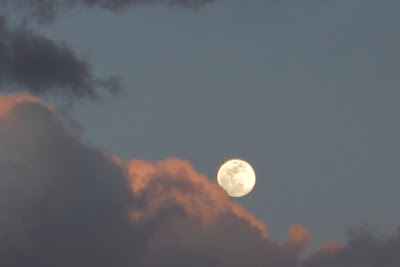
I have almost nothing to say, in the face of that whole experience, besides thank you, thank you. I am so glad to have been there. Give me beauty, put me in its path, and I will do my best to be there, to give it back.

And then, a vee of geese made themselves heard, coming along from the west. I took pictures of them, too, though my zoom lens wasn't really up to the challenge, especially since the light was going so swiftly by this time, and they were so, so high.
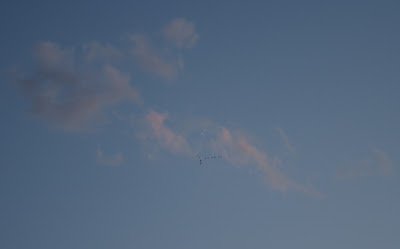
And then the dragon. And then a night with my excellent friends, one of whom is a year older today, sharing a birthday with one of his favorite authors. Tonight I will learn to make pecan pie, in honor of his starting the next year of his excellent life, without whose presence in my own life I would be a much diminished mind.
And I continue to marvel: there were flowers growing under that snow all the while. All they needed was for that surprisingly heavy weight to melt off and let them back into the air.
